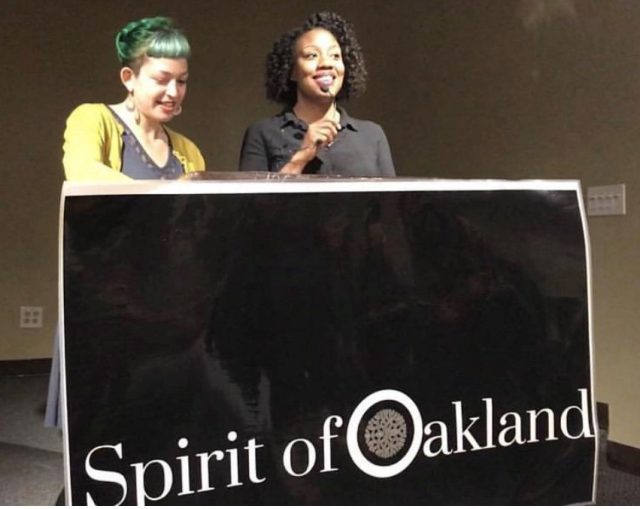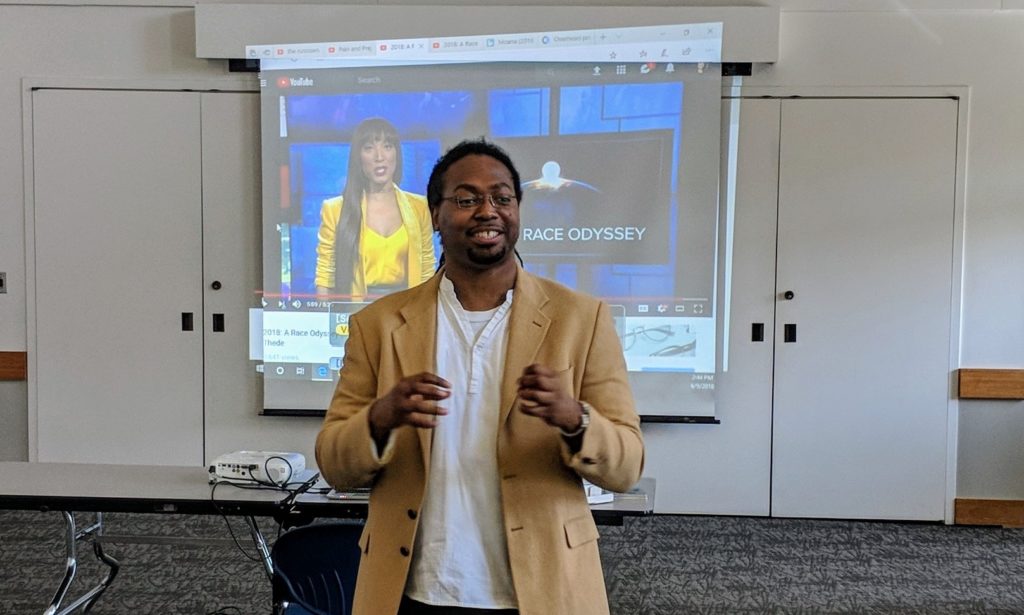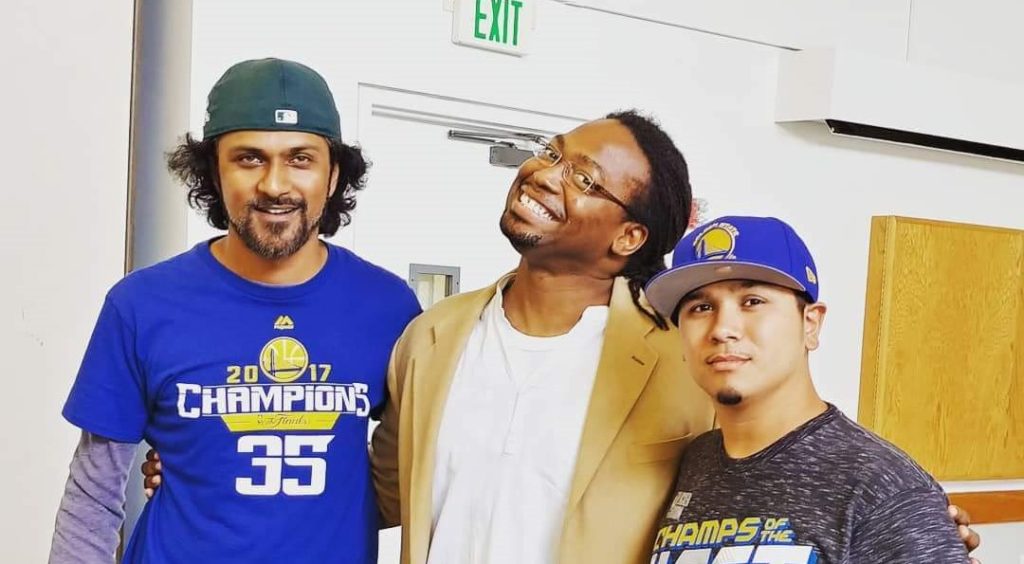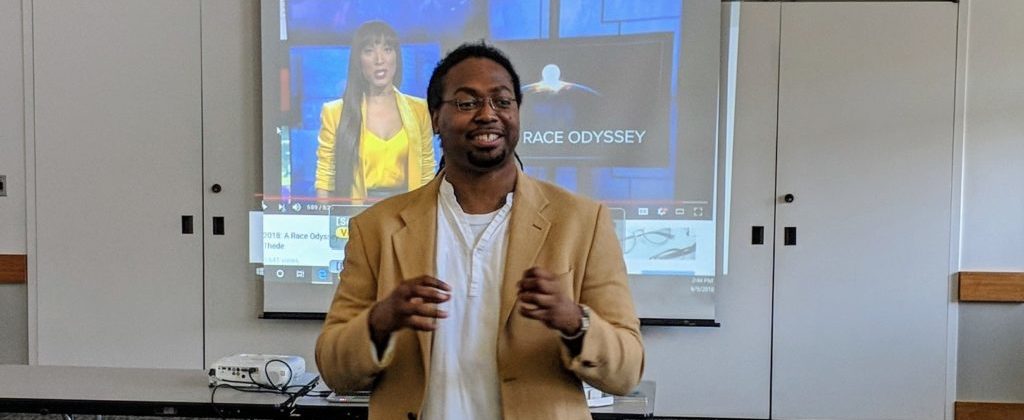by Ravi Valleti. This post was originally published on the Science Rising blog on June 25, 2018.
Imagine a Science where we feel wholeness in ourselves. Why let Starbucks diversity trainings have all the fun? Art and entertainment, such as the movie, “Black Panther,” make discussions on race and identity enjoyable. The Scientific Method, when conducted properly, considers perspectives of the broadest range. Which is why the “Black Panther” lives.
It is no surprise that women scientists from the African diaspora and from Indigenous communities have led on equity and justice in STEM. Dr. Stephani Page created the hashtags #MarginSci and #BlackAndSTEM. Dr. Chanda Prescod-Weinstein inspires us to Decolonize Science. Thanks to them, we’ve come a long way.
An anniversary
June 21, 2017 was one of the most painful days of my life – one of racist abuse and tone-policed tacit consent of that abuse. It’s been one year since I presented J. Ama Mantey’s inspiring op-ed “#MarginSci: The March for Science as a Microcosm of Liberal Racism“ to fellow “Satellite” organizers in the March for Science, hoping to catalyse further reform in Science. As with each movement, pushback from privileged moderates as well as from hateful extremists was as predictable as nuclear decay rates.
Over the next few months, those of us advocating for #MarginSci would dream for new means to organize without draining ourselves. Thanks to Oakland’s own Ryan Coogler, writer and director of “Black Panther,” the game changed in February 2018.
The Wakanda Example
Marvel’s “Black Panther” movie imagines a futuristic African nation called Wakanda, where black people have created the most technologically advanced place on earth, led by a Black woman scientist. In reality, black people are largely underrepresented in STEM. She should not be a spectacle limited to big screens. So, OakSci had to represent The Town!

The scientific community must be more vulnerable to help the most vulnerable. We must ask ourselves the hard questions in order to step outside our comfort zone and grow. Multiple fronts for discussion have begun. There have been online in Twitter chats via @WakandanSTEM @WokeSTEM @VanguardSTEM. The January “Diversity Day” at Oakland’s College Preparatory School was a STEM diversity outreach day for high school students. Gary McDowell of Future of Research served in allyship at Lakeview Library by Lake Merritt, and shared that he talks to a lot of scientists and he gets a lot of push back on issues of equity. The leader of the Philadelphia Serenity House, named Oh, grounds us in meditation with Serenity Soular, a collaborative project working to build the green economy in North Philadelphia. BLM Philly, and Philadelphia Science Action. Showing up in person and being exposed to the vulnerability of the discussion can be fraught with nerves, but it’s essential for us to practice overcoming implicit bias.
We need more than just education for Black and Latinx students, hiring and retention in the workforce and in academia, and fair and equitable wages to those of white males in STEM. Wakanda would not perpetuate harassment of marginalized scientists and engineers, nor dismiss their trauma. The most lauded scientific journals in Wakanda would not celebrate those who committed or tacitly consented to the abuse of marginalized scientists, or allow those privileged leaders to take credit or be praised at the expense of the well-being of people of color. In Wakanda, those who risked the most, financially as well, to foster those scientific reforms would be credited honorably.
STEM for the marginalized in the real world
Divide-and-conquer isn’t relegated to colonial history. In modern America, the model minority myth has been particularly harmful, pitting people of color against each other. While “Black Panther” helps me heal from my own family’s colonized roots, this is a movie by black people for black people; the rest of us are honored guests. I, as an Indian-American, work to honor the sacrifices of black and indigenous people who have fought for my civil rights. But while I was an engineer, I was concerned with the lack of representation and equity in STEM. That’s when I realized just how unfair being a “model minority” is. There’s been disproportionate burden on Black and Indigenous people to pave social justice paths for Asian-Americans like me. It’s not just white, hetero, cis, able-bodied people who need to do better for marginalized scientists.

On June 9, 2018, people of varied races, ages, and backgrounds felt glimpses of Wakanda at the Rockridge Library. Kalimah Priforce of Qeyno Group discussed the ‘digital divide’ and his incredible work with nationwide hackathons for underserved students. Dalila Dynes eloquently showed us how ‘Spirit of Oakland’ uplifts those displaced by Tech wealth in the Bay Area to fight gentrification and homelessness. Robin Lopez, M.Sc. of SACNAS (Society for the Advancement of Chicanos and Native Americans in Science), a self-proclaimed “kid from the Richmond (CA) hood,” told us about braving the odds to enter UC Berkeley’s Environmental Science Ph.D. program this fall. If not for Robin, my ‘March for Science San Francisco’ co-leader on diversity and inclusion, I might have left STEM activism.
Our event included a key contributor, Tre Germany, a black male scholar, and other students who shared the isolation they experience in STEM settings. We discussed two great videos on Scientific & Medical Racism, and Afrofuturism by BET’s “The Rundown with Robin Thede.” A visit by Kinchasa Taylor of Gen X Eco Solutions, an environmental consulting group, stressed that Black students should broaden their STEM education beyond computer coding. As a proud HBCU graduate, Taylor feels she has seen Wakanda for herself. For Robin and me, it was important to hold space for Black people having a discussion for and by Black people.

Going Forward
Since that workshop our nation has been facing an even more severe border crisis. Black and brown scientists and engineers are leading discussions on the misuse of science for family separation and detentions. We encourage the scientific community to speak out using our particular expertise against the connections between for-profit prison-industrial complex, I.C.E. raids, “Tender Age” centers, etc. Would the council of Wakanda approve of abuse of Science to rip children from their parents?
Next month, on July 6-8 the SIGNS Summit: Science | Government, Institutions & Society will take place in Chicago. The March for Science, and STEM broadly, has a chance to foster an opportunity to uplift marginalized communities. Much has improved this year, with reinforcement by Diane Burkholder, of the DB Approach, through her social justice training consultation with March for Science. The summit organizers are making a big effort to center diversity and equity issues in the conference.
The science community needs to wake up and better address the institutional racism inherent in the system. More must rise. Wakanda Forever!
Ravi Valleti is the futurist author of his developing ‘Posthuman Memoir’ called “Rocket Scientist.” He is the lead actor of “Devised” and is in “Overwhelm the Sky,” both upcoming independent feature films. Valleti volunteers as Caretaker of OakSci – Oakland Coalition for Science and as a #MarginSci advisor to the March for Science movement. He earned a double B.S. in Mechanical & Aerospace Engineering from the University of California Irvine Campuswide Honors Program.

